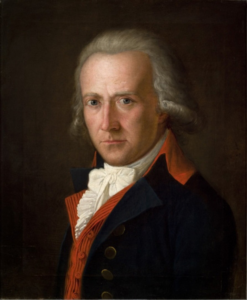Completion
(Poet's title: Vollendung)
Set by Schubert:
D 579A
previously catalogued as D 989
Schubert did not set the stanza in italics[September or October 1817]
Wenn ich einst das Ziel errungen habe,
In den Lichtgefilden jener Welt,
Heil der Träne dann an meinem Grabe,
Die auf hingestreute Rosen fällt.
Sehnsuchtsvoll, mit banger Ahnungswonne,
Ruhig, wie der mondbeglänzte Hain,
Lächelnd, wie beim Niedergang die Sonne,
Harr ich, göttliche Vollendung, dein!
Eil, o eile mich empor zu flügeln,
Wo sich unter mir die Welten drehn,
Wo im Lebensquell sich Palmen spiegeln,
Wo die Liebenden sich wiedersehn.
Sklavenketten sind der Erde Leiden;
Öfters, ach! zerreißt sie nur der Tod!
Blumenkränzen gleichen ihre Freuden,
Die ein Westhauch zu entblättern droht!
When I have finally achieved the goal,
In the realms of light in the world beyond,
I shall then greet the tears by my grave
As they fall onto the roses that have been strewn there.
I am full of longing, with an anxious sense of anticipation,
I am calm, like the moonlit grove,
I am smiling, as at sunset,
This is how I am waiting for you, divine completion!
Hurry, oh hurry so that I can fly up
To where worlds revolve beneath me,
Where palm trees are mirrored in life-giving springs,
Where lovers meet each other again!
The sufferings of earth are slave chains;
Often, oh, they are only shattered by death!
Earth’s joys are like garlands of flowers,
Whose petals a westerly breeze threatens to blow off!
All translations into English that appear on this website, unless otherwise stated, are by Malcolm Wren. You are free to use them on condition that you acknowledge Malcolm Wren as the translator and schubertsong.uk as the source. Unless otherwise stated, the comments and essays that appear after the texts and translations are by Malcolm Wren and are © Copyright.
☙
Themes and images in this text:
Evening and the setting sun Flowers Flying, soaring and gliding Graves and burials Heaven, the sky Light Longing and yearning Mirrors and reflections Night and the moon Palms Pouring, scattering and strewing Roses and pink Springs, sources and fountains Surface of the water Tears and crying Woods – groves and clumps of trees (Hain)
If life is a journey, death is the destination.
If life is a task, death is its completion.
If life is slavery, death is freedom.
Matthisson’s text uses each of these three common metaphors in ‘Vollendung‘ (completion? fulfilment? accomplishment? achievement?). The speaker declares that s/he is looking forward to death. However, since the speaker claims both to be ‘as calm as a moonlit grove’ and at the same time impatient (urging death to come quickly and provide wings ready for the flight to heaven), we should probably conclude that the words are intended to reflect some of the tension that must be felt by so many people with a terminal illness. It may be the pain of their condition that has reconciled them to the inevitability of death and led them to desire a quick end.
What is the purpose of a poem such as this? Are we expected to read this as a factual description of a real person’s positive acceptance of the promise of heaven? Surely anyone who was totally positive and hopeful would feel no need to make such a declaration. It is more likely that the poem serves a rhetorical function. It is persuading others (mourners, of course, but also us as ordinary readers, who will face death ourselves at some point) that the metaphors represent truth rather than delusion, that life is going somewhere, that there is a purpose and a task to be accomplished. The alternative is that life is life and death is the end of life. The word ‘end’ has a strange ambiguity, though. It can mean either ‘annihilation’ or ‘purpose’. Life can end or it can lead to ‘an end’, a goal. The word ‘completion’ has none of this ambiguity. It involves the idea that there is something that has been completed or fulfilled, there is something to show for what has happened. This is ‘Vollendung’ – literally, a ‘full ending’. The alternative is an empty ending. The End.
☙
Original Spelling and notes on the text Vollendung Wenn ich einst das Ziel errungen habe, In den Lichtgefilden jener Welt, Heil! der Thräne dann an meinem Grabe, Die auf hingestreute Rosen fällt. Sehnsuchtsvoll, mit banger1 Ahnungswonne, Ruhig, wie der mondbeglänzte Hain, Lächelnd, wie beim Niedergang die Sonne, Harr' ich, göttliche Vollendung, dein! Eil', o eile mich empor zu flügeln, Wo sich unter mir die Welten drehn, Wo im Lebensquell sich Palmen spiegeln, Wo die Liebenden sich wiedersehn! Sklavenketten sind der Erde Leiden; Oefters, ach! zerreißt sie nur der Tod! Blumenkränzen gleichen ihre Freuden, Die ein Westhauch zu entblättern droht! 1 Schubert appears to have changed the original 'hoher' (high / great) to 'banger' (anxious)
Confirmed by Peter Rastl Gedichte von Friedrich von Matthisson. Erster Theil. Tübingen, bei Cotta, 1811, page 66; and with Gedichte von Friedrich Matthisson. Mannheim in der neuen Hof- und akademischen Buchhandlung. 1787, pages 12-13.
First published in Poetische Blumenlese auf das Jahr 1786. Göttingen, bey Joh. Christian Dieterich, page 218, with an additional stanza between stanzas 1 and 2
To see an early edition of the text, go to page 66 [88 von 380] here: http://digital.onb.ac.at/OnbViewer/viewer.faces?doc=ABO_%2BZ185186703


